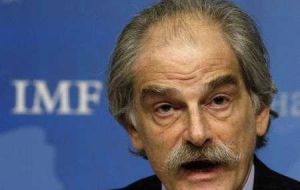MercoPress. South Atlantic News Agency
IMF urges Uruguay to temper domestic demand and secure a “soft economic landing”
 IMF First Deputy Managing Director John Lipsky
IMF First Deputy Managing Director John Lipsky The International Monetary Fund urged Uruguay to focus policies on securing “a soft economic landing” amid a surge in capital inflows to emerging economies and higher commodity prices.
In an annual review of Uruguay's economy, the IMF said fiscal and monetary policies should “temper domestic demand growth to help steer the economy away from a boom-bust path and create policy space to respond to future shocks.”
The IMF said economic growth was likely to slow somewhat in 2011 to around 5% from about 8% to 8.5% in 2010. Sustaining growth at 4% over the longer run was “feasible” if the authorities tackled infrastructure development and a shortage of skilled labour, IMF said.
The review said that inflationary pressures were building, with headline inflation in December at 6.9%, which is at the upper end of the inflation band. IMF staff estimates that core inflation, which excludes food, could reach 7.7%.
“Strong domestic demand and the risk of inflation expectations becoming stuck above official targets call for a continued measured normalization of the monetary stance,” the IMF added.
The IMF said Uruguay's fiscal position was “robust,” but urged the government to be more ambitious in its fiscal targets for 2011-2014.
“More conservative fiscal targets for 2011-14 would better support a soft landing, reduce appreciation pressures, and achieve a faster reduction in the public debt,” it added.
IMF said Uruguay has no major vulnerabilities in the financial system and praised the recapitalization of the Central Bank of Uruguay, while suggesting a few ways for the bank to strengthen its influence on inflation and keep itself capitalized.
On the currency front, IMF staff said their assessments indicate Uruguay's exchange rate is not “out of line with long-run fundamentals.”
Under Article IV of the IMF articles of agreement, the IMF holds bilateral discussions with members about economic development and policies, usually every year. IMF staff prepares a report based on its research. On January 28, 2011, the IMF Executive Board concluded the consultation with Uruguay, “and considered and endorsed the staff appraisal without a meeting”.
The appraisal comes on the background of statements from IMF First Deputy Managing Director John Lipsky who anticipated that most of the world will have to tighten monetary policy, reduce budgetary stimulus and continue with the process of structural reforms
In an interview with Dow Jones Newswires Lipsky said “exchange rate policies can be part of supporting that process”.
Lipsky said many of the emerging economies are running out of excess capacity, “and yet most of them still have in place the expansionary, accommodative monetary and budgetary policies”.
In what seems a change shift in IMF thinking Lipsky added there “could be a limited role for capital controls”. However first and foremost, “governments should ensure their basic economic policies are well balanced, and they should do this through proper monetary policy, tight budgets and a well-regulated financial sector”.




Top Comments
Disclaimer & comment rulesCommenting for this story is now closed.
If you have a Facebook account, become a fan and comment on our Facebook Page!